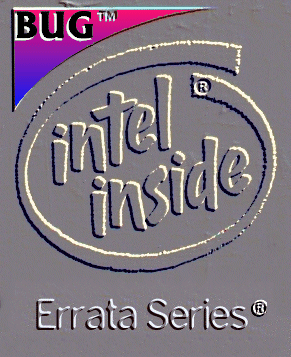BY ROBERT R. COLLINS
P54C Erratum 23 -- Slight Precision Loss for Floating-point Divides on Specific Operand Pairs
PROBLEM: For certain input datum the divide, remaindering, tangent and arctangent floating-point instructions can produce results with reduced precision.
IMPLICATIONS: Your answers will be wrong.
WORKAROUND: Due to the extreme rarity of this flaw, a workaround is not necessary for almost all users.
When this bug was first reported, Intel denied that it existed. After this bug was proven to exist, Intel denied that it was a problem. When customers wanted a replacement chip, Intel demanded that *THEY* (the customer) prove that they were affected by this bug. Yet to this very day, Intel refuses to acknowledge that this is a bug; instead they always refer to this as a flaw -- whatever the difference may be.
When I heard about the bug, I didn't think it was any big deal; and I still don't. But Intel's method of responded to the bug was a very big deal. Can you imagine the arrogance of Intel for refusing to honor their lifetime replacement warranty? This caused the momentum of public outcry to skyrocket. Intel relented, and performed an even greater arrogant act: they wanted you, the customer, to prove that the FDIV bug had affected you before they would replace your chip. That policy caused the public outcry to reach the office of Intel's CEO. Uncle Andy Grove took to the internet in a plea for public understanding. But nothing seemed to knock the juggernaut of public outcry off of it's rocker.
The debate about FDIV raged on the internet. I made the mistake of stating publicly that I didn't think that the FDIV bug was that big of a problem. In fact, I defended the existence of the FDIV bug. My stance caused a huge public outcry of it's own. For some reason, people thought I was defending the way Intel handled the bug -- which I wasn't. But it seemed clear from this discussion that many people were under the mistaken impression that their chip was supposed to be flawless. Sure it's supposed to be, but in reality that's just a pipe dream. Any chip with 3 million transistors is going to have bugs. In this case, it was Intel's handling of the bug that caused all of the public outcry -- not the bug itself.
Intel finally relented to the public outcry, and announced an unconditional replacement policy for any and all Pentium's affected by this bug. Like I said, I never thought the FDIV bug was that big of a deal. In fact, I've never even sent in my Pentium-90 for a replacement. That should indicate how serious I thought this bug was to me. Instead, I'll continue to wait for a very long time before I send in my chip for replacement. My Pentium-90 has long been end-of-lifed (that means discontinued). I'll continue to wait until just about every Pentium-class processor has been discontinued. Then I'll send in my Pentium-90 for replacement. Maybe Intel will send me whatever's left in their inventory -- maybe a Pentium-200 with MMX?
However long it takes, I'll continue to wait and to dream. But I won't hold my breath for that Pentium-200 with MMX to arrive at my door anytime soon.
